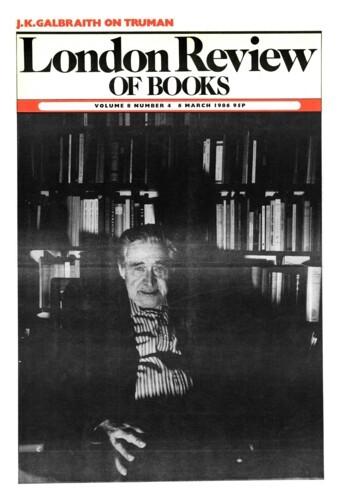Qui êtes-vous, Sir Moses?
C.R. Whittaker, 6 March 1986
Julian Barnes’s recent best-seller, Flaubert’s Parrot, quotes a letter from Flaubert to Feydeau: ‘When you write the biography of a friend you must do it as if you were taking revenge for him.’ Sir Moses Finley has been my teacher, colleague and friend for close on twenty years, and while I am not intent on taking revenge on his behalf, I can’t claim to be able to write dispassionately about his work, on the occasion of the publication of his new book, Ancient History: Evidence and Models, and of the republication in paperback (with additions) of Democracy Ancient and Modern and The Ancient Economy. 1985 has been something of an annus mirabilis for Finley. Not only has Evidence and Models brought his total number of books to a round dozen (not counting books of collected articles and edited papers), but the year has seen translations of Politics in the Ancient World flamboyantly launched in France and Italy, where he was fêted by academics and the popular press in a manner normally reserved for politicians or pop stars. This brings the number of translations of Politics in the Ancient World to about ten, including one in Catalan. Full-page, sober interviews in Le Monde and La Repubblica might have been expected; the interest shown by Rinascita and La Révolution, given Finley’s radical credentials, is not so surprising; but there aren’t many scholars who receive the accolade of being quoted by Elle. Qui êtes-vous, Sir Moses? demanded the headline of Valeurs Actuelles. Can we imagine such an interest in an academic historian being voiced in Britain?

